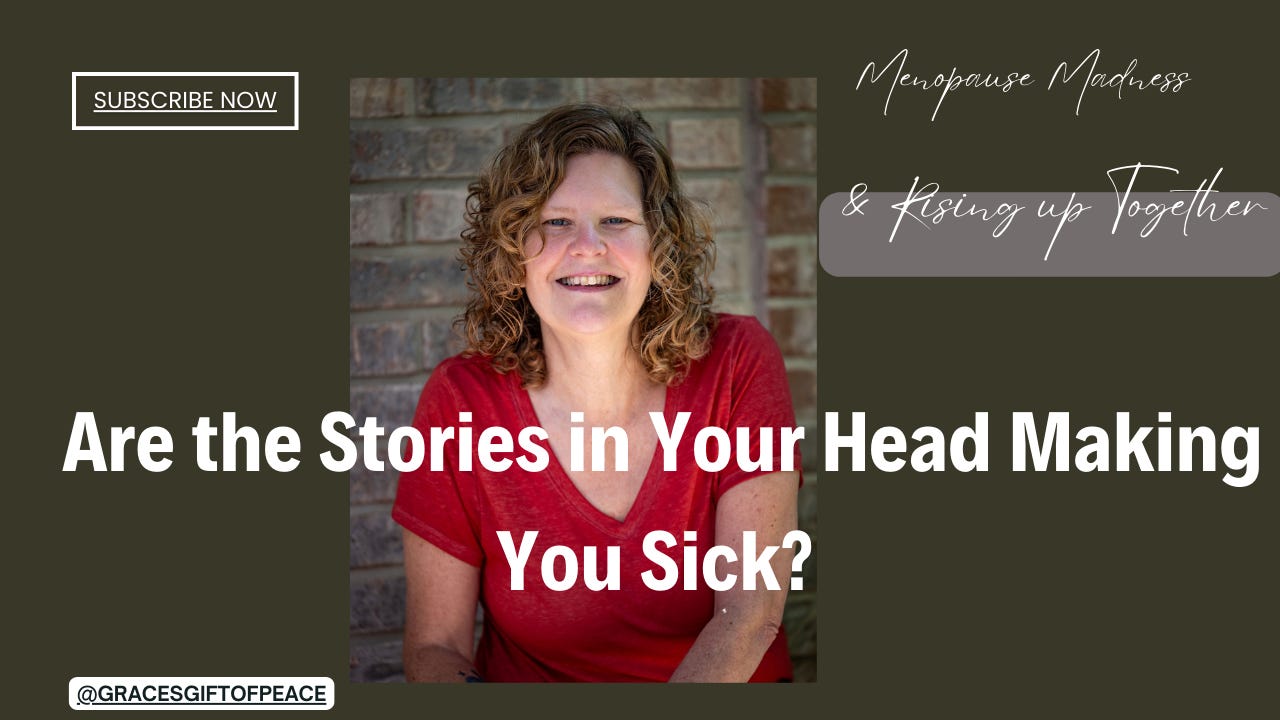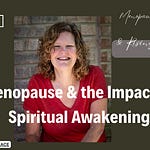Welcome to Menopause Madness! In today's video, I will share a bit about my hellacious week. Before you panic and hit the stop button, let me tell you that it has a benefit related to menopause and also helps with understanding the mind-body connection. As I managed to grow from this experience, like others in the past, I will share those insights as well.
This video will focus heavily on emotional wellness and how much it ties into the body. Spoiler alert: this cold sore I’m dealing with will be explained in a way that will blow your mind! So let’s jump in.
On Monday, which was about a week ago from the recording of this video, I received an early morning call from my mother asking me to come to her house immediately because my sister had passed. This was somewhat unexpected, but not entirely, as my sister had been very sick, and we thought she had more time. However, this video isn't about that. Obviously, it was more than a little bit of a shock to my system.
What followed was a lot of emotional strain, my mom dealing with a lot, and me reverting to old patterns of taking on responsibility for other people’s feelings. As the week progressed, I took on more responsibility for caring for my mom—not that I regret it, as I’m glad to help her, and I very much relate to what she’s going through, however; I made the mistake of putting her feelings before my own, which turned out to be detrimental.
By Thursday, three days later, I was really struggling physically. I then received a text message from my credit card company saying a charge had been declined. I created a whole dramatic story in my head about it, which I won’t go into, but suffice it to say, I had the “sky is falling” mentality. As a result of the chaos in my mind, my cortisol levels bottomed out, and I ended up sitting in my client's bathroom crying. After I pulled myself together, I left work, went home, put on comfortable clothes, and laid down on my grounding sheet on my bed to have a pity party for a while.
Actually, this part took place on Friday, the following day. On that day, I learned that the credit card company had actually done me a favor by declining the charge. It led to me discovering that I had been incorrectly charged for something I returned many months earlier, and I ended up getting quite a bit of money back. But all the drama from the previous days left me feeling completely exhausted.
On Friday morning, I woke up with a lovely cold sore. It made me think of a podcast I had watched earlier in the week between a woman whose name escapes me at the moment (I'll link the video in the details), and Scott Britton, a Substack publisher and creator. The woman talked about something called German New Medicine. This science involves CT scans of the brain, which, without contrast, can pinpoint anomalies in the brain and indicate where in the body a person might struggle and why. The research was dismissed by the powers that be, but the science has been proven through multiple case studies. This is where the mind-body connection comes into play.
What happens when we experience trauma—whether big or small—is that it gets stored in our system and creates havoc. It can even go back as far as when we were in the womb. While this may sound a little “woo-woo,” there is science to back it up.
Now, what does all of this have to do with menopause and my cold sore? Let’s start with the cold sore. The woman in the podcast explained that when a person feels unsafe, their body may respond with skin blemishes, like acne, as a protective mechanism. The body is trying to create balance in times of threat, which is something that our body is always trying to do. A few years ago, after I had a car accident where I totaled my car, I noticed a cold sore the next day. I researched and found that cortisol levels, which tend to spike during stress, can lead to cold sores. The body is trying to create balance when it feels threatened, and cortisol, as the body's hormone balancer, steps in to help.
While cortisol can be helpful in the moment, long-term elevation of cortisol creates downstream problems, such as hormonal imbalances that can lead to gut imbalances and the cycle continues.
By Friday, I was exhausted. I decided to meditate in the shower before heading to work and thought about what kind of boss I would want in this moment. Then it hit me—I am the boss! I realized I could make the decision to take the day off because I privately signed my client. I thought, what’s the point of being self-employed if I’m not a good boss to myself? I decided I wanted to be the kind of boss who said, “I see you're having a hard time. Take the day off.” So, I did.
This ties into the self-care aspect of menopause. When things are out of balance, it’s important to take whatever measures necessary to restore balance as quickly as possible. This doesn't mean running off to Hawaii on vacation, but there are things you can do in the moment to restore that balance.
Although I didn’t catch myself quickly enough during the week, by Friday, I took it easy. I put my laptop in my bed, put on sweatpants, a comfy shirt, and fuzzy socks, and laid on my grounding sheet for most of the day. I took a long shower, called my mom to check in on her, and didn’t do much else. By the end of the day, I was still very tired and knew something was off balance. It felt like my blood sugar couldn’t keep up, and I declared to the universe, "I’m done with this. I’m not putting up with this anymore. I choose to feel better."
Almost immediately, the thought came to me to take an adaptogen blend that I keep on hand for stressful events. After taking it and going to bed, I woke up feeling like a new person. My cortisol levels had been so out of whack, affecting everything from insulin levels to motivation to hormones. Once my body was nourished, I felt much better.
This brings me to the bigger point: the mind-body connection. The story you’re caught up in, often replaying in your mind, can directly influence your health. In my case, my cold sore was a simple example, but the effects of this story play out in bigger ways, such as hormonal imbalances. These things get stored in your nervous system, which can lead to physical dis-ease.
To help calm your nervous system, I recommend grounding, adaptogens, breathwork, and being present in the moment. I also took the step of seeking help from a friend who does integration sessions. During these sessions, you go into the issue you're struggling with and address the voice in your head—the one that creates all the doom and drama. It can wreak havoc if you let it. The key is awareness and learning to move beyond that voice. You can choose to love it, or empower it by saying, "I understand what you're facing, but we're doing this anyway."
Knowing that you're not the voice in your head is the first step toward improving your physical and emotional well-being. Once you can let go of those stories and the stress they create, you'll regain energy and mental bandwidth. Letting go of those beliefs will help you reclaim your health during menopause.
I’ll wrap it up here. Please check out the video linked in the description, and feel free to comment or ask questions. I’m preparing for a menopause summit on the 25th, where I’ll be speaking live. Free tickets are available, and I’ll add the link to the description as well. There's also an option for VIP tickets to access the recordings at your leisure. The VIP ticket covers all of the speakers, including 17 of us. You can gain valuable knowledge for free or for a low price of $97 for unlimited access.
I look forward to seeing you there!













Share this post